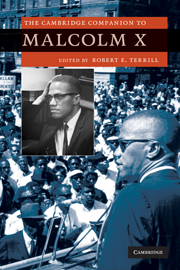Book contents
- Frontmatter
- Introduction
- 1 Malcolm X and Elijah Muhammad
- 2 Autobiography and identity: Malcolm X as author and hero
- 3 Bringing Malcolm X to Hollywood
- 4 Malcolm X and black masculinity in process
- 5 Womanizing Malcolm X
- 6 Malcolm X and the Black Arts Movement
- 7 Malcolm X and African American conservatism
- 8 Malcolm X and youth culture
- 9 Homo rhetoricus Afro-Americanus: Malcolm X and the “rhetorical ideal of life”
- 10 Judgment and critique in the rhetoric of Malcolm X
- 11 Nightmarish landscapes: geography and the dystopian writings of Malcolm X
- 12 Afrocentricity and Malcolm X
- 13 Malcolm X in global perspective
- 14 The legacy of Malcolm X
- Guide to further reading
- Index
4 - Malcolm X and black masculinity in process
Published online by Cambridge University Press: 28 May 2010
- Frontmatter
- Introduction
- 1 Malcolm X and Elijah Muhammad
- 2 Autobiography and identity: Malcolm X as author and hero
- 3 Bringing Malcolm X to Hollywood
- 4 Malcolm X and black masculinity in process
- 5 Womanizing Malcolm X
- 6 Malcolm X and the Black Arts Movement
- 7 Malcolm X and African American conservatism
- 8 Malcolm X and youth culture
- 9 Homo rhetoricus Afro-Americanus: Malcolm X and the “rhetorical ideal of life”
- 10 Judgment and critique in the rhetoric of Malcolm X
- 11 Nightmarish landscapes: geography and the dystopian writings of Malcolm X
- 12 Afrocentricity and Malcolm X
- 13 Malcolm X in global perspective
- 14 The legacy of Malcolm X
- Guide to further reading
- Index
Summary
Now that we have entered what some pundits have called a post-racial America - one in which race should matter less but often matters even more - the best-selling memoirs of James McBride (Color of Water) and Barack Obama (Dreams from My Father) may eclipse the Autobiography of Malcolm X in college courses and in bookstore sales. One of the reasons for this possibility is that white American mothers figure prominently in the lives of these black men, thus it could be argued that their autobiographical selves make the case for their Americanness in a way unavailable to Malcolm X. Framed another way, McBride's and Obama's direct connection and lineage to the white world may render them more sympathetic, more appealing, to white Americans than black male autobiographers whose backgrounds do not embody such perceived symbolic cache. Moreover, when he was the Democratic presidential candidate in 2008, President Obama's biracial story cultivated even more interest among white Americans. But if we were to jettison Malcolm's Autobiography from our collective memory, we would remove a foundational and innovative text in an ever-evolving African American autobiographical tradition. A most powerful voice that spoke honestly and, yes, erringly, about the role of black men in American society, Malcolm offered intriguing and at times controversial notions of what constituted appropriate black male behavior. The Autobiography is a bridge between Richard Wright's Black Boy and the perils of life under Southern and Northern Jim Crow and the forerunner to literary contemporaries like McBride, Obama, and Nathan McCall (Makes Me Wanna Holler).
- Type
- Chapter
- Information
- The Cambridge Companion to Malcolm X , pp. 51 - 62Publisher: Cambridge University PressPrint publication year: 2010
- 3
- Cited by



